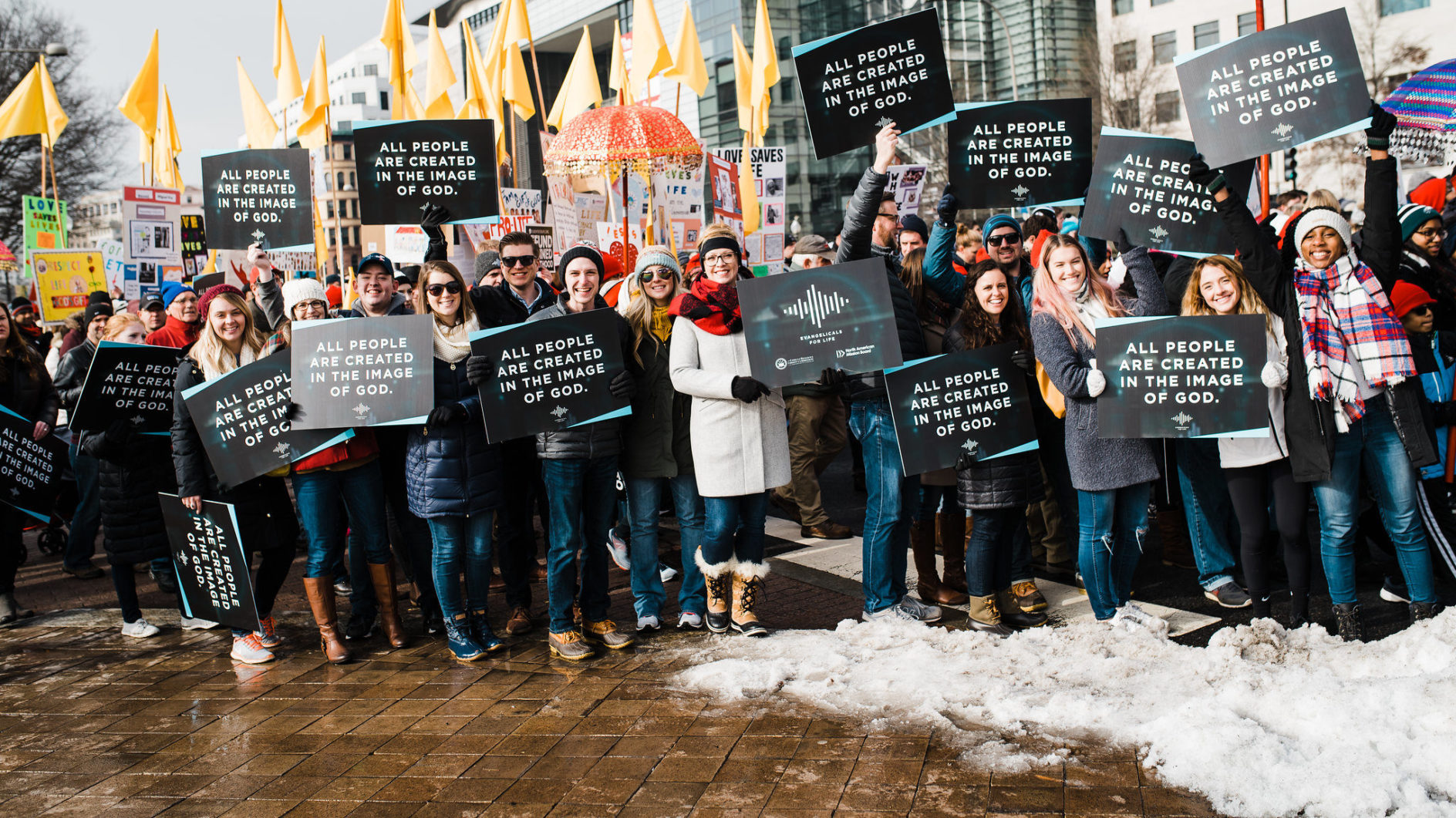The debate in Washington over infanticide is rightly shocking to many, but tragically, flows from the abortion industry’s recent advocacy for late-term abortion.
On Jan. 22, the chamber of the New York legislature filled with cheers as the state further codified abortion up until the moment of birth with the Reproductive Health Act. The One World Trade Center was then lit pink to celebrate Gov. Andrew Cuomo’s signing the bill into law. The following week, further south, Virginia Del. Kathy Tran introduced an equally grievous bill, known as The Repeal Act, to allow for an abortion to occur in the third trimester for any reason. In seeking to understand the limits of her proposed abortion bill, fellow state Del. Todd Gilbert asked if a woman who "has physical signs that she is about to give birth. Would that be a point at which she could still request an abortion if she is so certified? She's dilating."
The shock for many began when hearing Ms. Tran’s response: "Mr. Chairman, that would be a, you know, a decision that the doctor, the physician and the woman would make at this point."
"I understand that. I'm asking if your bill allows that," Gilbert replies.
Affirming the extreme position that has stained the mainstream of American discourse on abortion, Ms. Tran says, "My bill would allow that, yes.”
The public conversation then took a ghoulish turn the following day when Virginia’s governor, Ralph Northam, defended Ms. Tran’s proposed legislation on a Washington-area radio station, WTOP, “This is why decisions such as this should be made by providers, physicians, and the mothers and fathers that are involved,” Northam said. “When we talk about third-trimester abortions, these are done with the consent of obviously the mother, with the consent of the physician—more than one physician, by the way—and it’s done in cases where there may be severe deformities. There may be a fetus that’s non-viable.”
Northam goes on to explain what he means, “If a mother is in labor, I can tell you exactly what would happen, the infant would be delivered. The infant would be kept comfortable. The infant would be resuscitated if that’s what the mother and the family desired, and then a discussion would ensue between the physicians and the mother.”
Make no mistake, the Virginia governor, in defending late term abortion, advocated for infanticide.
The “discussions that would ensue” would be a decision whether or not to end the life of a child born alive simply on the basis of whether or not the child is wanted. And the “severe deformities” mentioned with regard to abortion is often thinly veiled language for Down syndrome. For example, Iceland boasts an near elimination of Down syndrome in their country, but what they have actually done is eliminate through abortion their unborn neighbors who were diagnosed with Down syndrome.
The applause for late-term abortion in New York and the defense of infanticide in Virginia led U.S. Sen. Ben Sasse (R–Neb.) to the floor of the Senate on Thursday, Jan. 31, to call for a vote on his legislation to protect the very babies Gov. Northam advocated for leaving on the table.
The Born-Alive Abortion Survivors Protection Act, currently sponsored by Sen. Sasse as both S.130 and S. 311, would amend the federal criminal code to require any health care practitioner who is present when a child is born alive following an abortion or attempted abortion to, first, exercise the same degree of care as reasonably provided to any other child born alive at the same gestational age, and second, ensure that such a child is immediately admitted to a hospital. The bills currently enjoy the cosponsorship of over 45 Senators, including Senate Majority Leader Mitch McConnell (R–Ky.).
The Born-Alive bill is important because current federal law lacks sufficient legal protection and medical provision for children who survive failed abortions. When a child is born alive, whether in a hospital, at home, or in an abortion clinic, any action taken to end that child’s life is and always ought to be considered murder. Withholding medical care from such an infant denies the human dignity affirmed to that precious child by God. Such a callous dereliction of responsibility by the legal system also denies that child’s basic human right of life as guaranteed by the United States Constitution.
But then on Friday, Jan. 31, the controversy surrounding Gov. Northam took one more unexpected turn when a photo from his medical school yearbook was released. The photo on Northam’s page is of two young men at a party with one dressed in blackface and the other in a Klu Klux Klansmen outfit. As the story developed over the weekend, ERLC President Russell Moore weighed in to highlight what we’re missing in the scandal: “Many—on both the political Right and the political Left—are calling on the governor to resign. I agree with that call. Still, we shouldn’t let this moment pass by without sensing the underlying crisis. Abortion culture and racial injustice are not two separate impulses. They are one.” He continued:
Both seek to make invisible the vulnerable neighbor one’s group wishes to sacrifice for their own ends. Both use a spectrum of ways to get around the human conscience, which, when functioning, would recoil at smothering a baby on a table or lynching an African-American man. . . . Both of these aspects are rooted in the counter-Christ idolatry that sees human dignity and lives worth living defined by power.
The ERLC is committed to the vision Christ gives us of the kingdom of God where people flourish because human dignity is upheld and the justice required by Scripture is fulfilled. This is why the ERLC policy team in Washington advocates for justice as defined by Christ, whether the assault on human dignity comes from a white supremacist in the streets of Charlottesville or a governor on the airwaves of WTOP radio. As Moore stated in the above article, “Abortion and racial injustice are alike an affront to human dignity, and to the image of God.” In this moment of national debate, it is once again critical for the people of the cross to respond with clarity.
Thankfully, Sen. Sasse was clear when he took to the Senate floor to speak about Gov. Northam’s comments on the radio, "We’re talking about fourth-trimester abortion or what anyone in the normal world calls infanticide.” Sasse then fast tracked his Born-Alive legislation under the Rule XIV process and told the Senate he planned to ask for a vote by unanimous consent the following Monday. Asking for unanimous consent is a practice employed by the Senate often to do a variety of things such as congratulate the Super Bowl champions or even to take more significant actions like in 2016 when the Senate declared through unanimous consent the crimes in Syria and Iraq to be genocide.
On Monday, the Nebraska senator followed through and asked his colleagues for unanimous consent to ensure legal protection and medical care for a baby born alive after a failed abortion. In addition to Sen. Sasse’s leadership, Leader McConnell and Sens. Ernst (R–Iowa), Hawley (R–Mo.), Lankford (R–Okla.), and Braun (R–Ind.) each spoke in support of the Born-Alive bill.
The vote, however, was blocked by Sen. Patty Murray (D–Wash.). Sen. Murray arrived on the floor in time to object and then promptly left. Her reasoning for objecting was that it was “a gross misinterpretation of the actual language of the bill that is being asked to be considered.” After her objection, Sen. Ernst replied, “This body can no longer unanimously condemn murder.”
On Tuesday evening in the State of the Union address, the president pledged to sign legislation to protect children from infanticide as well as a bill to prohibit late-term abortions of pain-capable children. Sen. Joe Manchin (D–W.V.) explained after the speech why he was one of the few on the left side of the aisle open to support such a prohibition, “Late term abortions are just horrific, totally just wrong.”
The House joined the debate on Wednesday as Rep. Ann Wagner (R–Mo.) reintroduced the Born-Alive Abortion Survivors Protection Act in her chamber of Congress as well. Rep. Wagner was joined on the House floor by Minority Whip Steve Scalise (R–La.) and many other members where they called for floor consideration of the legislation.
As this debate on late-term abortion unfolds, taking a stand against infanticide is a good place for our policymakers to start. Infanticide is a grotesque injustice, and the failure to say so is as inexcusable as it is morally reprehensible. Protecting the lives of living babies should not be a partisan issue.
Americans deserve to know where their elected officials stand on infanticide. The ERLC joins with the pro-life advocacy community in urging the U.S. Senate to take a roll call vote soon on the Born-Alive Abortion Survivors Protection Act.
This moment in American life may well cause some in the pro-life community to despair, but there are reasons for hope all around us if we look for them. In the very state that sparked this current debate, and whose governor confuses legal protection for innocent life as a personal religious matter rather than a matter of law and justice, is a reminder of the human dignity of the unborn. At the base of the One World Trade Center, recently lit pink to celebrate late-term abortion, New York memorialized the thousands of lives our country lost on Sep. 11, 2001. Among those souls lost to eternity that tragic day were 11 women expecting children. Forever etched in stone at the memorial reads the name of the expectant mother “and her unborn child.” Here, New York is right, and we join them in grieving the loss of both precious lives because both were made in the image of God.
The pro-life work for human dignity is a long arc, but the work is worth it. We move the debate forward because we ourselves have been moved by the good news of the kingdom of Christ. “Some of the consciences cheering on abortion, or slavery, or racism, or a multitude of other ghastly injustices may well be turned around, and may in good time lead in the cause of life and dignity and justice.” Moore reminds us in his piece titled, “When People Cheer Abortion,” written at the beginning of all of this last month, “We speak still, and, ultimately, we win. I suppose what I mean to write here is a Sunday school answer, one that is both true and beautiful. I know the answer is ‘Jesus.’ We’re just watching to see how to get there.”
Chelsea Patterson Sobolik and Jeff Pickering contributed to this article.









